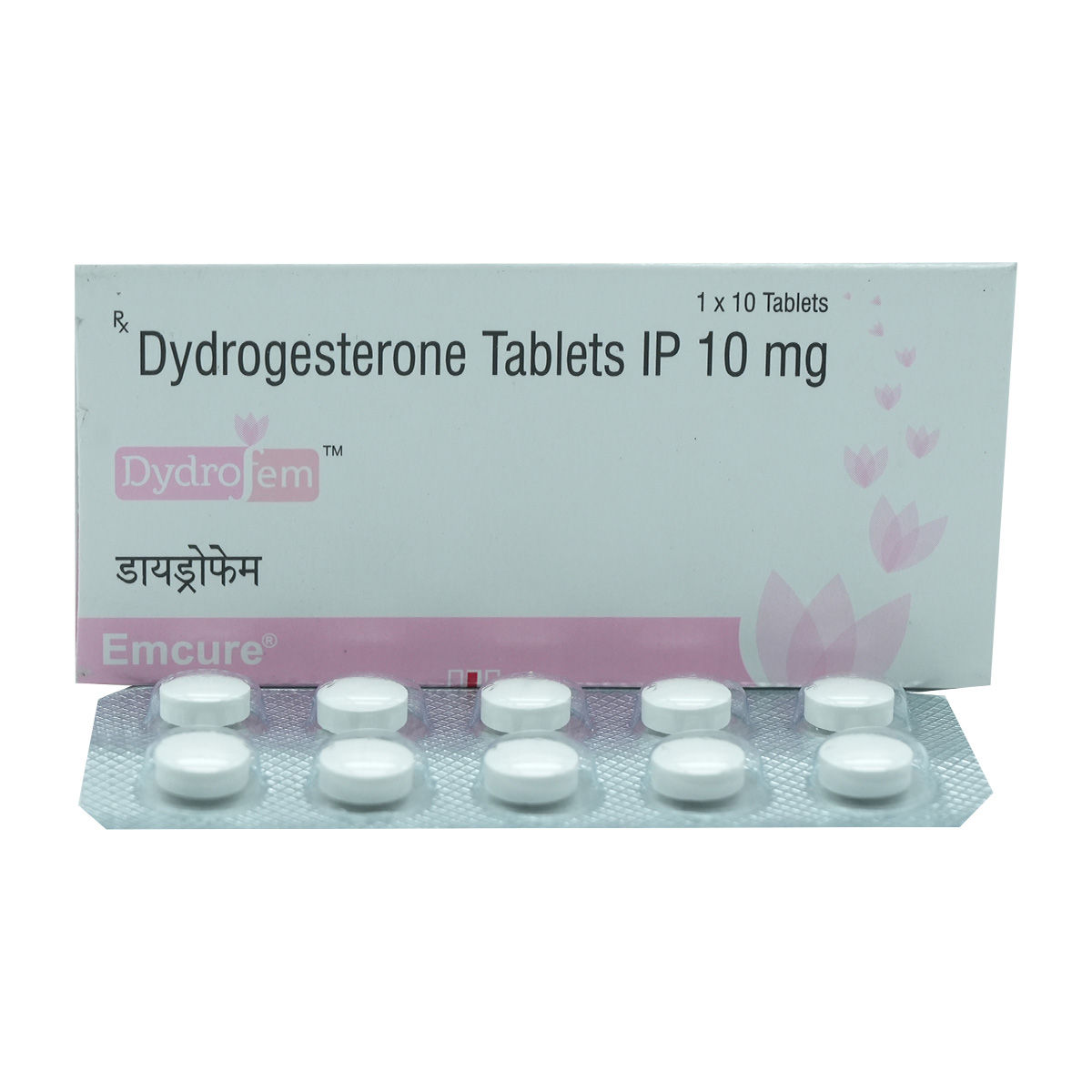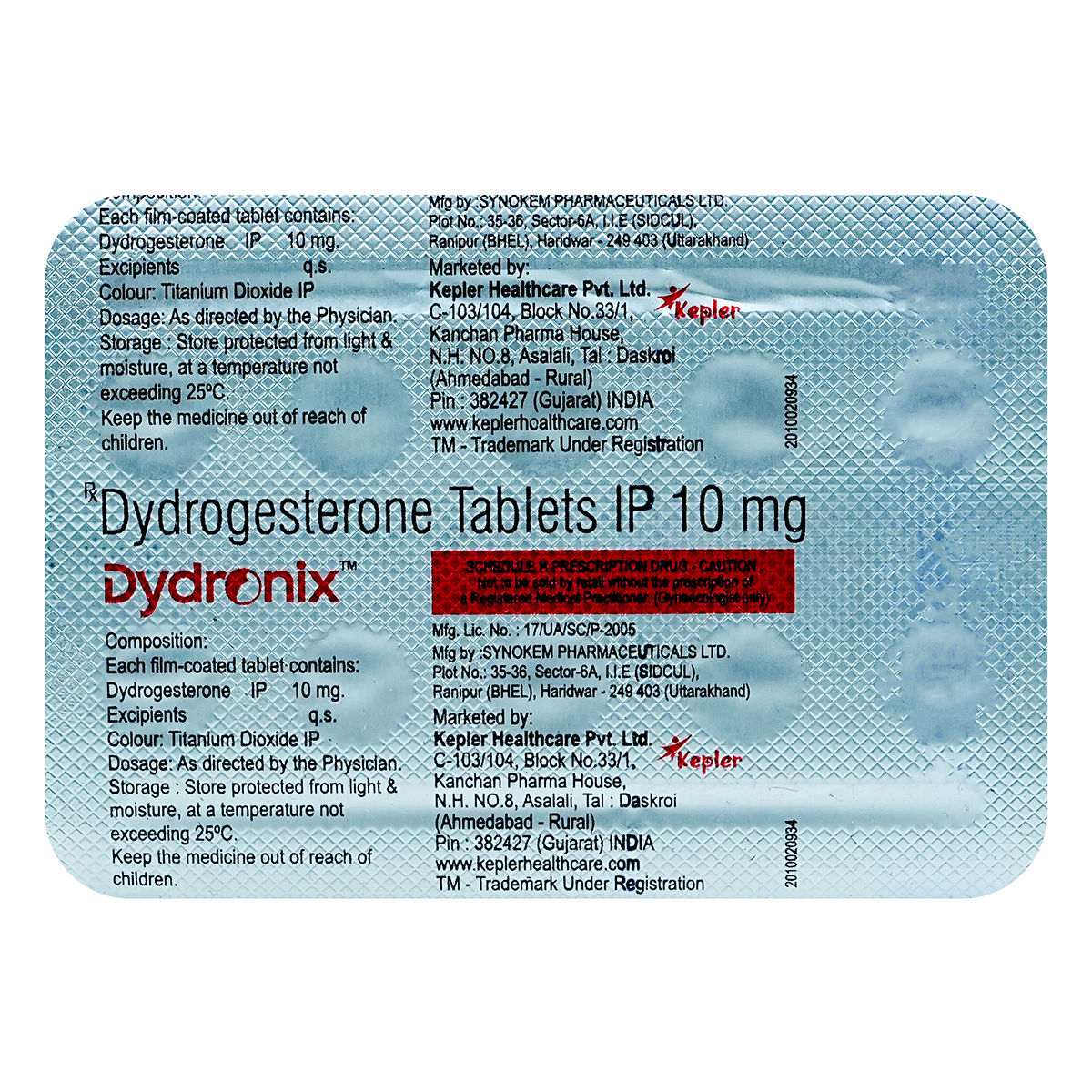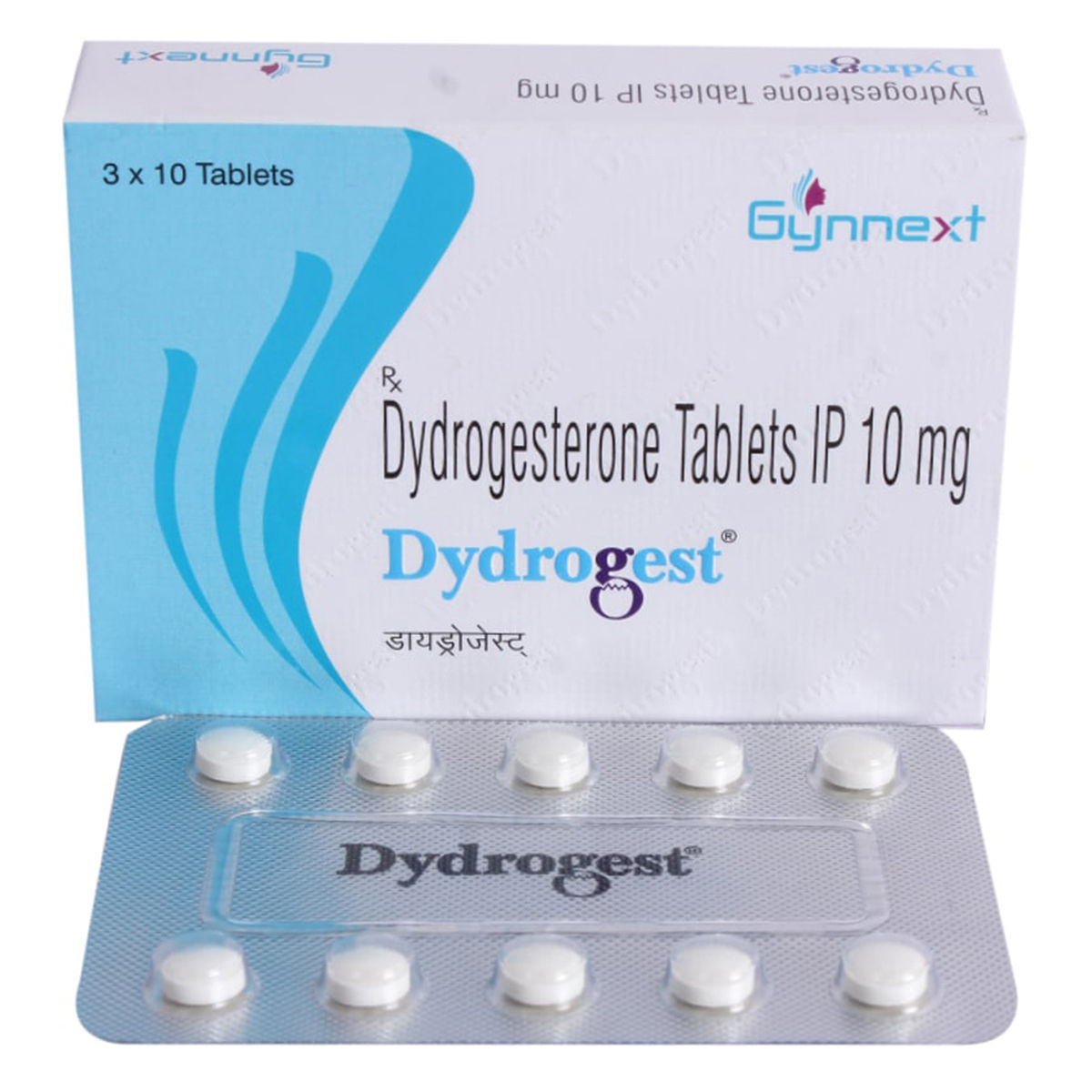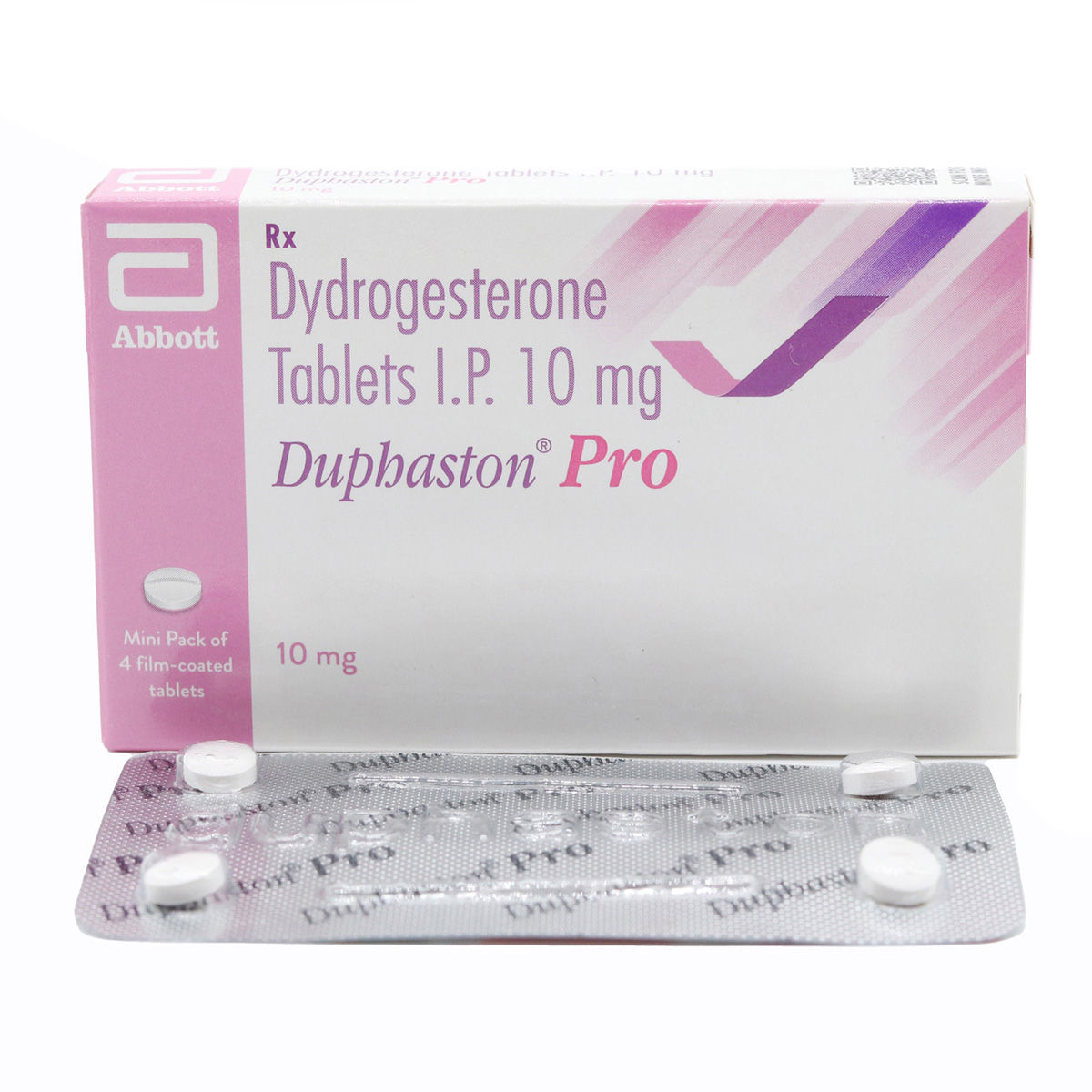About DYDROGESTERONE
DYDROGESTERONE refers to the class of drugs known as steroid hormones. It is also combined with estrogens for hormone replacement therapy in menopausal women and low sex hormone levels in women. Infertility is the inability to conceive within 12 months. On the other hand, Premenstrual syndrome comprises signs and symptoms like mood swings, tender breasts, food cravings, fatigue, irritability, and depression. It occurs during certain days of the menstrual period in females, generally just before their menses.
DYDROGESTERONE is a female hormone that controls women's ovulation and menstruation. DYDROGESTERONE causes secretive changes in the uterus's endometrium lining, promotes the breast's development, relaxes the uterus, blocks the maturation and release of the follicle, and retains pregnancy.
Your doctor will advise your dose and how often you need to take this medication based on your medical condition. While using this medicine, you may sometimes have breast tenderness, swelling in other parts of the body, headaches, migraines, mood swings, depression, acne, tummy (abdominal) pain, back pain, and vaginal bleeding. Most of these side effects of DYDROGESTERONE do not require medical attention and gradually resolve over time. However, if the side effects are persistent, reach out to your doctor.
Try not to stop taking this medicine of your own. Using DYDROGESTERONE may increase the risk of blood clots. Make sure that before taking this medicine, you inform your doctor if you have had breast cancer, unusual bleeding in the vagina, liver disease, or any other health problems. If you are taking any other medicine or are allergic to any medication, please inform your doctor. Avoid smoking and alcohol to prevent any unpleasant side effects. DYDROGESTERONE should not be used if you have heart disease or dementia because this medicine may increase your risk of developing these conditions.
Uses of DYDROGESTERONE
Infertility, Prevention of miscarriages, Dysfunctional uterine bleeding, Irregular menses cycle, Dysmenorrhoea( painful periods), Endometriosis (A disorder in which tissue that normally lines the uterus grows outside the uterus), Treatment of threatened and habitual abortion associated with proven progesterone deficiency.
Medicinal Benefits
DYDROGESTERONE is a female hormone that regulates ovulation and menstruation in women. It helps in maintaining a healthy womb lining during the pregnancy stage. DYDROGESTERONE helps initiate the menses cycle (periods) in women who have not yet reached menopause. Besides this, it prevents overgrowth of the uterus in postmenopausal women who take estrogen as hormone replacement therapy (HRT). DYDROGESTERONE is used to regulate the uterine lining in postmenopausal women receiving estrogens who have not removed their uterus through surgery. It also helps treat amenorrhea (cessation or irregular menses cycle for more than three months). It is also given in combination with estrogens as part of menopausal replacement therapy. The injection form of DYDROGESTERONE is prescribed for treating abnormal uterine bleeding along with irregular or ceased menstrual cycles. The intravaginal gel form of DYDROGESTERONE assists in reproductive technology for infertile women with progesterone deficiency or irregular or ceased menstrual cycle. The vaginal insert form of DYDROGESTERONE supports early pregnancy and implantation of an embryo in the uterus. Off-label use of DYDROGESTERONE helps in reducing the risk of preterm birth.
Directions for Use
Storage
Side Effects of DYDROGESTERONE
- Abdominal pain
- Bloating
- Headache
- Dizziness
- Depression
- Breast tenderness
- Hot flushes
- Vaginal discharge
- Joint pain
- Urinary problems
- Nausea
- Fatigue or extreme tiredness
- Somnolence or sleepiness
- Vaginal haemorrhage
- Pruritus (severe itching of the skin)
In-Depth Precautions and Warning
Drug Warnings
DYDROGESTERONE with estrogens should not be used to prevent heart disease, heart attacks, strokes, or dementia. Using DYDROGESTERONE with estrogens may increase the chance of getting heart attacks, strokes, breast cancer, and blood clots. In some cases, using DYDROGESTERONE with estrogen may produce dementia among women aged 65 and older. Do not use DYDROGESTERONE if you are allergic to peanuts, have unusual vaginal bleeding, have had any cancer (breast or uterus cancer), or undergoing estrogen plus progestin treatment. Tell your doctor before using the DYDROGESTERONE if you have had a heart attack, stroke, blood clot, liver problems, kidney problems, pregnant, breastfeeding or planning to get pregnant, asthma (wheezing), epilepsy (seizures), diabetes, migraine, endometriosis, lupus, heart problems, thyroid, or have high calcium levels in your blood. Use caution while driving a motor vehicle, as dizziness or drowsiness may occur. If you are using DYDROGESTERONE before any lab tests or biopsies, tell your doctor about this, as it can affect the report values. Patients with rare hereditary problems like galactose intolerance, lactase deficiency or glucose-galactose malabsorption should not take the DYDROGESTERONE.
Drug Interactions
Drug-Drug Interactions: This medicine may interact with medications, including anticonvulsants (e.g. acetazolamide, carbamazepine), anti-infectives (e.g. metronidazole, clindamycin), and certain herbal preparations (e.g. Ginkgo Biloba).
Drug-Food Interactions: DYDROGESTERONE may interact with grapefruit or grapefruit juice and St. John’s wort plant (used for anti-depression).
Drug-Disease Interactions: DYDROGESTERONE may interact with disease conditions, including breast cancer, liver disease, thromboembolism, depression, fluid retention (oedema), glucose intolerance, retinal thrombosis (blocked vein of the retina of the eye), thyroid disease, high cholesterol (hyperlipidemia), uterine bleeding, ovarian cyst, and weight gain (obesity).
Drug-Drug Interactions Checker List:
Safety Advice

Alcohol
cautionYou are recommended not to consume alcohol along with DYDROGESTERONE to avoid unpleasant side effects.

Pregnancy
safe if prescribedDYDROGESTERONE can be safely used in pregnant women. Your doctor will weigh the benefits and potential risks before prescribing them. If you have any concerns regarding this, discuss them with the doctor.

Breast Feeding
cautionDYDROGESTERONE should be used in breastfeeding mothers only if the benefits outweigh the risks. Your doctor will weigh the benefits and potential risks before prescribing them. Please consult your doctor.

Driving
cautionIt is advised to drive with caution after taking DYDROGESTERONE as it may interfere with driving capabilities. It can make you feel drowsy.

Liver
cautionLimited information was available for the use of DYDROGESTERONE in patients suffering from liver impairment. Please consult your doctor if you have any concerns regarding using DYDROGESTERONE in patients with liver impairment. Your doctor will prescribe only if the benefits outweigh the risks.

Kidney
cautionLimited information was available for the use of DYDROGESTERONE in patients suffering from kidney impairment. Please consult your doctor if you have any concerns regarding using DYDROGESTERONE in patients with kidney impairment. Your doctor will prescribe only if the benefits outweigh the risks.

Children
unsafeDYDROGESTERONE is not recommended for children below 12 years of age.
Habit Forming
Diet & Lifestyle Advise
- Do regular exercise and physical activity to minimize hot flushes and improve sleep. Besides this, weight-bearing exercises can help in making your bones strong. Aerobics, yoga, and activities like tai chi may help relax the body and mind.
- Try to wear loose clothes before going to bed and sleep in a cool, well-ventilated room. Doing this can prevent symptoms of hot flushes and night sweats. Take a minimum sleep of 8 hours.
- Avoid or limit intake of caffeine-containing beverages, alcohol, and spicy food, as these are known triggering agents for hot flushes.
- Try to be stress-free to improve your mood swings due to hormonal fluctuations.
- Quit smoking as it will help to reduce hot flushes and your risk of developing chronic conditions like heart disease, stroke, and cancer.
Patients Concern
Disease/Condition Glossary
Female Infertility: When a woman is not able to become pregnant within a year of trying. If a woman gets pregnant but experiences miscarriages or stillbirths, it is classified under infertility.
Hormone replacement therapy (HRT): It is a treatment to relieve symptoms of menopause. It replaces hormones that are at a lower level as you approach menopause.
Premenstrual syndrome (PMS): PMS (premenstrual syndrome) is the name for the symptoms women can experience in the weeks before their menses period. Each woman's symptoms are different and can vary from month to month. The most common symptoms of PMS include mood swings, feeling upset, anxious or irritable, tiredness, breast tenderness, headaches, etc.




